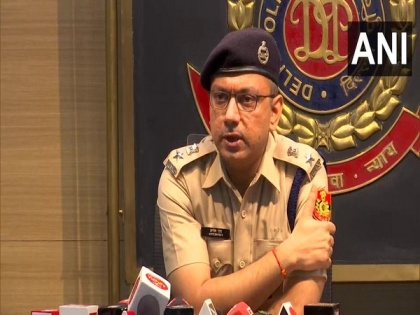14 cyber criminals held by Delhi Police from Jharkhand linked to 36 cases across 9 states
By ANI | Published: August 31, 2021 10:56 PM2021-08-31T22:56:06+5:302021-08-31T23:05:02+5:30
Delhi Police on Tuesday said that the 14 cyber fraudsters arrested on Tuesday from Jharkhand's Jamtara have been linked to 36 cases reported on the National Cybercrime Reporting portal from nine states.

14 cyber criminals held by Delhi Police from Jharkhand linked to 36 cases across 9 states
Delhi Police on Tuesday said that the 14 cyber fraudsters arrested on Tuesday from Jharkhand's Jamtara have been linked to 36 cases reported on the National Cybercrime Reporting portal from nine states.
"These 14 arrested fraudsters are linked to 36 cases reported on the National Cybercrime Reporting portal from 9 states. They cheated approximately Rs 1.2 crore in these 36 cases. They admitted to cheating four to five people daily," said Anyesh Roy, Deputy Commissioner of Police (DCP), Delhi Police Cyber Cell while addressing a press conference today.
He also informed that the police has launched 'Cyber Prahar' part 2 targetting cybercriminals operating from Jharkhand's Jamtara region.
Delhi Police's Cyber Crime Unit (CyPAD) conducted multiple raids over the last seven days and arrested 14 cyber criminals of Deoghar-Jamtara-Giridh-Jamui belt. Altaf Ansari, a mastermind nicknamed 'Rockstar' along with technical mastermind, Ghulam Ansari, also known as 'Masterji', were among those arrested.
"These people primarily commit UPI payment-related frauds. These fraudsters induce victims to make payment through UPI by impersonating themselves or using technology in the name of KYC, or blocking bank account or SIM cards," said Roy.
He further stated that these fraudsters have recently increased the use of technology. "Earlier, they used to call victims randomly and ask for bank details. They no longer use this method. They now make temporary websites and send bulk messages containing short URLs," Roy added.
( With inputs from ANI )
Disclaimer: This post has been auto-published from an agency feed without any modifications to the text and has not been reviewed by an editor
Open in app